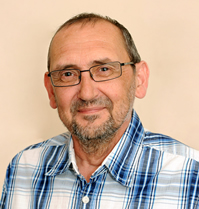Tom Hart
NHS Forth Valley Employee Director Tom Hart rolled his own cigarettes. He smoked around 15 a day but decided to quit the habit in 2003. Eight years later Tom developed a chest infection, a condition he was prone to because of asthma.
With the help of antibiotics the infection cleared up but, what was unusual, was the persistent tickly cough that was left behind.
Both his wife and office colleagues nagged him to see his GP. But Tom put the appointment off for four weeks because his daughter was getting married, and he and his wife had booked a week’s holiday following the wedding.
When Tom finally arrived at the surgery he was examined but the doctor could not hear anything in his chest. However, he was advised that if the cough was still there in aweek’s time, he needed to go to get an X-ray. The cough did not disappear so Tom heeded the advice. Four days later the senior partner in his GP practice phoned to advise that he had a tumour in his right lung.
“I was kind of stunned but I had started to think that there might be something wrong because I had lost a wee bit of weight around my waist”, he said. “I asked the GP if it was treatable and she said yes”.
Tom was referred to the chest clinic at Forth Valley Royal Hospital for more X rays and scans which revealed there was still some infection in his right lung but the tumour was in the middle. Until the infection was eradicated clinicians weren’t able to ascertain just how large the tumour was.
A dose of strong antibiotics did the trick and the tumour was revealed to be 4cm by 2.5cm. Tom was told it was the non-aggressive type and treatment would be surgery or radical radiotherapy – in his case the latter was the best option.
Tom was treated at the Beatson West of Scotland Cancer Centre in Glasgow in Glasgow. He was admitted as an inpatient to save the burden of travelling from Falkirk and received three doses of radiotherapy a day for the next 12 days. He still bears the scars – three ‘tattoos’ imprinted on his chest with a special pen, pinpricks to make sure he was in the right position for treatment whilst lying on the bed.
“I put my arms above my head and the procedure was like something out of Star Wars. Lying perfectly still I was surrounded by a myriad of lights and moving equipment for the next ten minutes.”
Tom suffered no side effects apart from a slight sore throat which disappeared over time.Some patients can become nauseous or have reddening of the skin like sunburn at the site of the rays, but Tom says he was lucky and didn’t have any of these problems.
In April 2013, Tom had another chest infection, followed again by a persistent cough. This time, he waited just one week before seeing his GP. Doctors found a 2cm tumour in his lung, which they were able to successfully remove via keyhole surgery in July 2013 and he was back at work four months later.
Tom has this message for anyone worried they may have lung cancer. “Go and get it checked.OK, sometimes you will get bad news but the treatments are so well advanced these days there’s a good chance of recovery. ”
Bill Culbard
Bill Culbard from Dunblane had a slight night-time cough, and thought it was nothing to worry about. That was until his friend – a nurse from California – visited, and along with his wife convinced him to get it checked out by a doctor.

Bill explained “My doctor was fantastic and took my concerns very seriously. I had X-rays taken and the next morning I was told there was a shadow across my lung which was swiftly diagnosed as inoperable cancer.”
Three weeks later Bill was undergoing chemotherapy and radiotherapy – treatment which lasted for nine months – and by December 2000, he was back at work.
Bill said: “Being diagnosed with cancer will always be a big deal and a huge worry, but if it’s caught early enough it really does make a difference to your options and chance of survival.
“The best thing I ever did was go to the doctor. Whether it’s a persistent cough, breathlessness, any of these things that aren’t normal for you should trigger a wee thought in your head to go and get checked out.
“Detecting the tumour early was the difference between life and death. If it hadn’t been diagnosed then I don’t think I’d have survived. The tumour had been growing for some time apparently and the early diagnosis was very, very important.
“My advice to anyone who finds themselves with a persistent cough that lasts more than a few weeks, or with other symptoms like spitting up blood that they’re concerned about, is to get it checked out with your GP. In most cases it’s nothing to worry about but it could save your life.”


